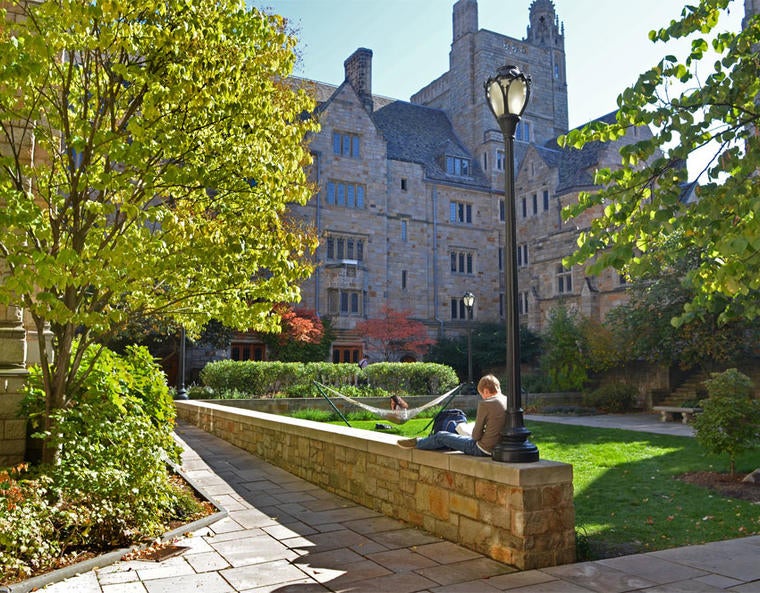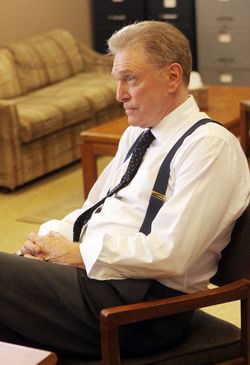
I don’t watch much TV in general, but LOST was one of the few shows I got really into while it was running. But because I had a sweet seminar on Postwar Japanese Culture that met every Tuesday night the same time as the show aired before it wrapped up last spring, I watch it online later (thank goodness for Hulu.com, the best friend of college students everywhere). So when chillin’ in my common room with a couple of buddies gathered round the laptop, I was surprised to see in the final season’s episode “Dr. Linus”, Yale pops up in in an alternate reality flashforward.
Disclaimer: I’m going to talk about LOST, but I swear, this is spoiler free and doesn’t require any familiarity with LOST. I’m gonna run on a bit of a tangent, though, so read it through all the way before you draw any conclusions.
In the episode’s flash forward, we see Alex, now a talented and driven senior in high school, studying for her AP European History test and applying to Yale. Alex feels she needs a recommendation from the (secretly evil) Principal Reynolds, a Yale alumnus, to stand a chance; Principal Reynolds wields this power to manipulate Dr. Benjamin Linus. Ben has to sacrifice his own ambitions to make Principal Reynolds give her the magical recommendation from a powerful alum to get her into the Ivy Leagues–once Ben gives in and the evil Yalie writes her a recommendation letter, her future is secured.

My reaction: “Hey wait… LOST is saying that Yale is evil?”
At first I resented the factual inaccuracies: a recommendation from Dr. Linus (who knew Alex well) would have been better than the letter from the evil principal (who was an alum but didn’t know her), I’m fairly sure Yale is NOT evil, etc. But with a little more thought, its easy to see why the producers of the show would use the buzzword “Yale” as a way to quickly invoke a characterization for the evil principal character, based on the Ivy League stereotype that some people hold: old money, powerful, snooty, elitist.
It raises the interesting question of what the words “Ivy League” means to different people, a question that I often encounter when people ask where I go to school.
I come from Spokane, WA. It’s not a small place by any means, but it is a place where only a handful of students consider going to the East Coast for school and fewer still would dream of “Ivy League”. When I’ve returned home from break as a college student, the questions about my college inevitably elicit a lot of reactions. There’s certainly praise and admiration from family friends and neighbors, but the people who don’t know me and form snap judgments from my status as a Yalie (running into that guy I used to debate in high school, or the man fixing my chain at the bicycle shop on 29th avenue) might associate me with that Ivy League stereotype.
I personally don’t put a lot of stock into the connotations that Ivy League carries. All it actually designates is an old football league among some of the nation’s oldest schools. It’s grown from that to imply the top-tier of academics and selectivity in admissions, which is largely true, but I feel like absolute rankings are kind of silly. If you put Yale next to University of New Haven, the name Yale would obviously carry more weight in recognition and that sense of shock n’ awe, but UNH has one of the top forensic science programs in the nation. These things are relative.
The point being: I like Yale not because of the weight the name carries to other people, but because of my own personal experience (that is, of course, far more than I can cram into this already verbose post). My suite includes me (a guy who worked hard at public school and receives a bunch of financial aid to come here), and a guy who traces his family back through 3 generations of Yale Men, living in a double with a first-generation American / college student. We’re all best friends, and those alleged indicators of status bear no relevance to our relationship. Trying to put too much stock in the Ivy League label to judge the character of the people you meet here is just silly.
But at the end of the day, it’s tough to give this long-winded explanation to someone I encounter briefly who asks about my school. There are definitely times I just have to accept that people’s elitist expectation of Ivy League will differ from what I know as my time here and my own values. And along with that, I have to accept that as much as I love LOST and its smoke monster polar bears eating psychics on a tropical island, not everything in the show is real. :D